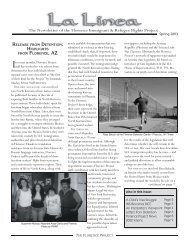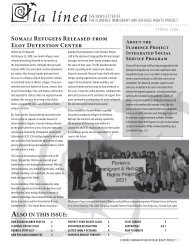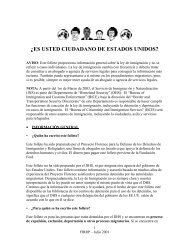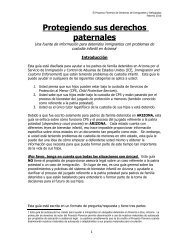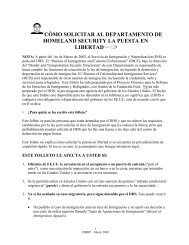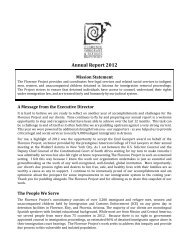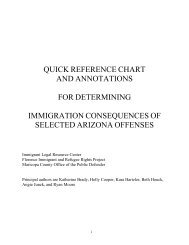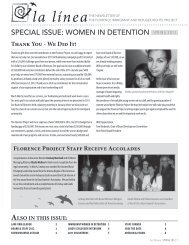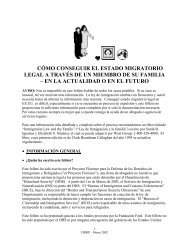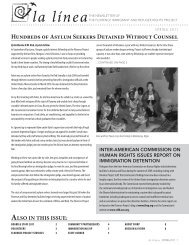HOW TO APPLY FOR ASYLUM - The Florence Project
HOW TO APPLY FOR ASYLUM - The Florence Project
HOW TO APPLY FOR ASYLUM - The Florence Project
You also want an ePaper? Increase the reach of your titles
YUMPU automatically turns print PDFs into web optimized ePapers that Google loves.
efore continuing your answer or the judge will only hear part of what you want to tell him or her. In addition,<br />
you should look at the judge directly when you speak, and not look at the ground or only at the interpreter.<br />
Otherwise, the judge may think you are lying or are not sure about what you are saying.<br />
When you answer questions, you can call the judge's attention to facts in the letters or other documents that<br />
you submitted. That way, you can make sure that the judge pays attention to them. If you have a witness,<br />
you will ask him or her questions. You should ask his or her name, address, occupation, and how he or she<br />
knows you. If the person has personal knowledge of the events that made you leave your country, you<br />
should ask questions about those events in particular. Ask open questions like "Who" "When" "Where"<br />
"Why" and "After that, what happened" so that the story comes out in the person's own words instead of<br />
in your words. Try not to ask questions like, "Is it true the guerrillas came to our village three times" or "I<br />
am not a dangerous person, right"<br />
• <strong>HOW</strong> DO I PREPARE <strong>FOR</strong> MY HEARING<br />
To get ready for your hearing,<br />
1. If possible, request articles, human rights reports, and other documents that can help you show the judge<br />
that you have been persecuted or will be persecuted if you return to your country.<br />
2. Review your declaration, your application and whatever else you turned in to the Court. Do this several<br />
times in order to be sure about facts, dates, and other details.<br />
3. Make a list of the most important events in your declaration, especially details about past harm or<br />
threats. <strong>The</strong> judge or trial attorney may ask you about these at the hearing. Practice talking about these<br />
events out loud. If you have a friend who can help you, ask him or her to read the documents and ask<br />
you questions as if you were at the hearing. If, at the hearing, the judge and trial attorney do not ask you<br />
about these events, be prepared to explain them yourself.<br />
4. If you have witnesses, write out the questions that you will ask them in Court. Go over these questions<br />
and their answers with them.<br />
Also, if you have had criminal problems,<br />
Get together letters of support and other documents in your favor (including your presentence<br />
report, if it is helpful), and prepare to talk about your criminal problems.<br />
• WHAT HAPPENS WHEN THE JUDGE DECIDES MY CASE<br />
Both you and DHS have the right to keep fighting the case by appealing the decision to a higher court called the<br />
Board of Immigration Appeals. This court is a group of judges in Virginia who look at all the papers filed in the<br />
case and everything that was said in court, and decide if the judge was right. In most cases, unless the judge<br />
made a mistake about the law or the facts in your case, the Board will not change the decision. As soon as the<br />
judge tells you the decision (unless you get it later, in writing), he or she will ask both you and the trial attorney<br />
whether you want to “reserve appeal,” that is, whether you want to hold on to your right to appeal. You can also<br />
“waive appeal,” which means to give up your right to appeal. If both sides “waive appeal,” that is the end of the<br />
case. If you “waive appeal” you will not be able to later change your mind and challenge the judge’s decision.<br />
Page 37 of 49<br />
FIRRP- last update June 2007



